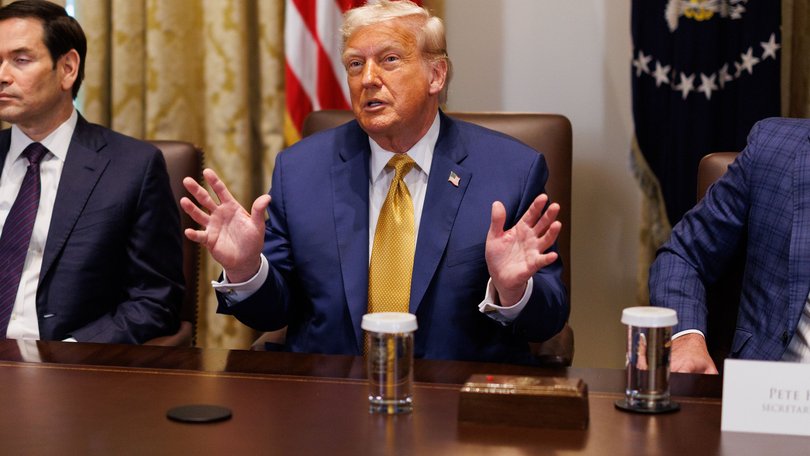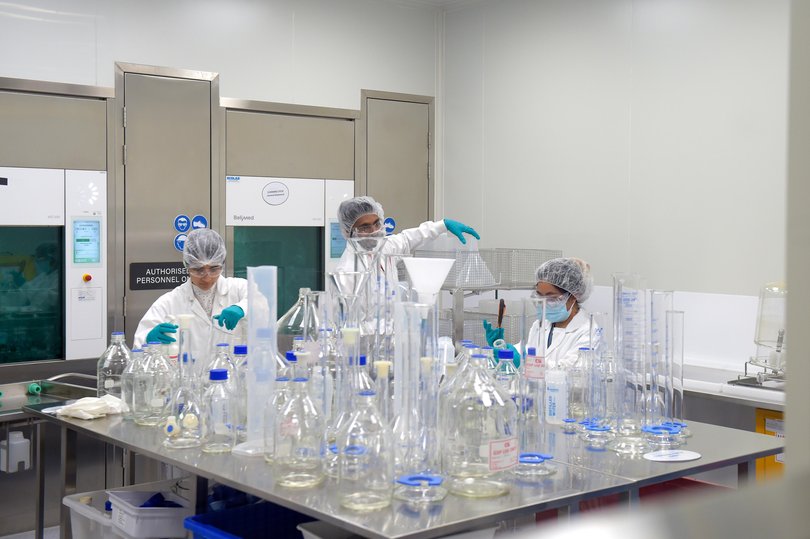JACKSON HEWETT: Australia’s biotech industry pops chill pill following Trump tariff scare
Donald Trump set sirens blaring in the biotech industry, but a thorough examination has executives believing the industry remains in rude health.

Donald Trump’s artless deal-making set sirens blaring in the biotech industry, but a thorough examination has executives believing the industry remains in rude health.
Overnight, the US President put two of Australia’s most important industries, pharmaceuticals and mining, on the tariff watch list.
Speaking to reporters before entering into a White House Cabinet meeting, Mr Trump said copper could face a 50 per cent tariff, before lining up the pharmaceutical sector for a nasty dose of medicine to force them to move production back to the States.
Sign up to The Nightly's newsletters.
Get the first look at the digital newspaper, curated daily stories and breaking headlines delivered to your inbox.
By continuing you agree to our Terms and Privacy Policy.“We’re going to give (drug manufacturers) about a year, a year and a half to come in, and after that, they’re going to be tariffed,” he said.
“They’re going to be tariffed at a very, very high rate, like 200 per cent. We’ll give them a certain period of time to get their act together.”
That set Australia’s Treasurer on edge, who described the developments as “very concerning”.
“Our pharmaceuticals industry is much more exposed to the US market, and that’s why we’re seeking, urgently seeking, some more detail on what’s been announced,” he told ABC Breakfast radio.
While copper is a key plank of mining giants BHP and Rio Tinto, it is not a big export from Australia. With the exception of relatively limited output from BHP’s Olympic Dam, most of the copper assets are based elsewhere, including Chile, Mongolia and Canada.
The pharmaceutical sector is a different story. At $1.9 billion in sales, it is Australia’s fourth largest export to the US after professional services, beef and gold.
The majority of that revenue is earned by one of Australia’s most successful companies, CSL, and relates primarily to blood plasma.
But the plasma is collected from US patients, before being separated and purified for therapeutic products like albumin, immunoglobulins, and clotting agents.
A CSL spokesman said the firm was “monitoring the situation closely” and noted the company had already engaged with the US Department of Commerce in its so-called Section 232 investigation into the national security of pharmaceutical imports.
That process, launched ahead of ‘Liberation Day’ should come to a conclusion by year’s end at the latest, but it looks like President Trump wants it wrapped up his new tariff deadline of August 1.
The question for CSL is whether blood plasma, sourced in the US and potentially altered at its Swiss or Melbourne plants counts as “pharmaceuticals and pharmaceutical ingredients, including finished drug products, medical countermeasures, critical inputs such as active pharmaceutical ingredients, and key starting materials, and derivative products of those items,” that the Commerce Secretary wants re-shored to America.
One biotech analyst told The Nightly that the investigation was more focused on forcing generic drug manufacturing, which had been offshored to China and India years ago to save costs, back to US shores.
The thinking inside the White House, if the conservative Project 2025 manifesto is to be believed, is to “systematically reduce and eventually eliminate any US dependence on Communist Chinese supply chains that may be used to threaten national security such as medicines.”
CSL, in its submission to the Section 232 investigation, said it “understands the Administration’s concern that certain countries may ‘weaponise’ control over pharmaceutical supplies” but exhorted the US Government to “focus its investigation on these specific non-allied countries, rather than on all imports”.
CSL is already a significant presence in the US pharmaceutical industry, with one division’s headquarters in Pennsylvania, 19,000 employees across 44 states, and $US3.1b invested in the country in the past seven years. It plans to invest another $US2b over the next five years scaling up US production.

That economic contribution should mean CSL has a “get out of jail free card” according to equity research firm MST Marquee. Given the company’s investment intentions and Trump’s relocation deadline of 18 months, they believe the company’s share price, which has fallen 44 per cent in the past six months, has ‘bottomed’.
“At (its) current price, CSL stock is pricing in ‘full tariff risk’, despite a material narrowing of that risk,” MST Marquee wrote to clients.
Pharma firms remain confident
David Williams, chair of burns and traumatic wounds specialist device manufacturer Polynovo, believes Australia’s biotech sector can weather the storm.
Polynovo is the major supplier of wound treatment technology to the US Department of Defence and Mr Williams said this policy would be harmful to US citizens.
“We’re the number one supplier of treatments for severe trauma and deep burns to the US market, including for the US military and veterans. Because these products are to treat trauma, we know they will need to be used regardless of price, and we don’t want to see those prices go up and place a further burden in terms of costs to patients,” Mr Williams said.
Polynovo was spun out of research conducted by the CSIRO and Mr Williams said Australia had an enviable reputation globally for pharmaceutical excellence, spawning “half a dozen companies” with valuations of a $1b or more.
“Everyone talks about how good Israel is at developing such companies, but Australia has produced more biotech ‘unicorns’. We’ve got to be proud of that.”
According to the industry body AusBiotech, the life sciences sector employs almost 350,000 workers, with the number of companies in the space doubling to 2900 organisations since 2017. Since 2016, Australian medical products have been the greatest value-added export in Australia.
“Australian biotechnology and medical technology companies compete globally and operate within complex and interconnected international supply chains that drive the sector worldwide,” AusBiotech chief executive Rebekah Cassidy said. “With the right prioritisation it could play an even greater role in the future health, economic prosperity and health security of our country.”
Other biotech market darlings such as Cochlear and Resmed are expected to be exempt from the rules, because they are device companies rather than drug manufacturers.
Other companies were expected to simply increase their prices rather than relocate, with the tariffs applying to costs, rather than revenue. With the majority of expenditure occurring during the research and trial phase, the actual finished product is relatively cheap on a per unit cost basis, even if the price charged can be many hundreds of multiples of that.
The Nightly was told by one analyst that it was likely companies would just use the tariff announcement to increase prices to the end user. He said the US would be better served clamping down on prices charged to the US health system by pharmaceutical companies.
Medicines Australia chief executive Liz De Somer called for no tariffs and was working with the Government to understand the full implications of Mr Trump’s statement. However, she said the industry fully supported the Pharmaceuticals Benefit Scheme, “one of the longest-standing public health programs in the world.”
“We believe introducing tariffs on US imports of innovative medicines is not going to encourage Australian manufacturers to relocate to the US, but it will be detrimental to US competitiveness and increase their health care costs,” Ms de Somer said.
Copper heads row
While the Government and industry was scrambling to understand the implication for the pharmaceutical industry, analysts were also sizing up the impact of 50 per cent tariffs on copper.
BHP and Rio Tinto were down only slightly on the news, and Australian exports are unlikely to be heavily affected.
According to the Organisation of Economics Complexity, Australia exported $US5.6b of copper ore in 2023, with Japan the largest market. Germany was the fifth largest market at less than $US300 million.
US importers had already been stockpiling copper on fears of a tariff surge with analysts suggesting a leap in tariffs from an expected 25 per cent to 50 per cent would lead to a collapse in demand.
According to Citi Group, the US Government was likely to offer exemptions for copper imports with Chile, Canada and Mexico, all having already secured a 25 per cent rate.
BHP owns the Olympic dam copper mine in South Australia and Rio Tinto and BHP both have copper assets in Chile. Rio also has copper assets in Canada and the US.
Both companies share a joint venture copper mine in Arizona, which had so far failed to be an economic performer. This tariff deal may make that asset more strategic, analysts said.
However, given copper is a critical mineral the US needs if it is to accomplish its goals in leading the world in energy intensive data centres and AI, the smart money suggests any copper tariff would likely be wound back.
Minerals Council chief executive Tania Constable said she was more worried about the ripple effect of more tariffs.
“While Australia’s direct copper exports to the United States are limited, trade restrictions imposed on other key trading partners have the potential of disrupting global supply chains, increasing costs, and creating uncertainty for Australian exporters,” she said.

